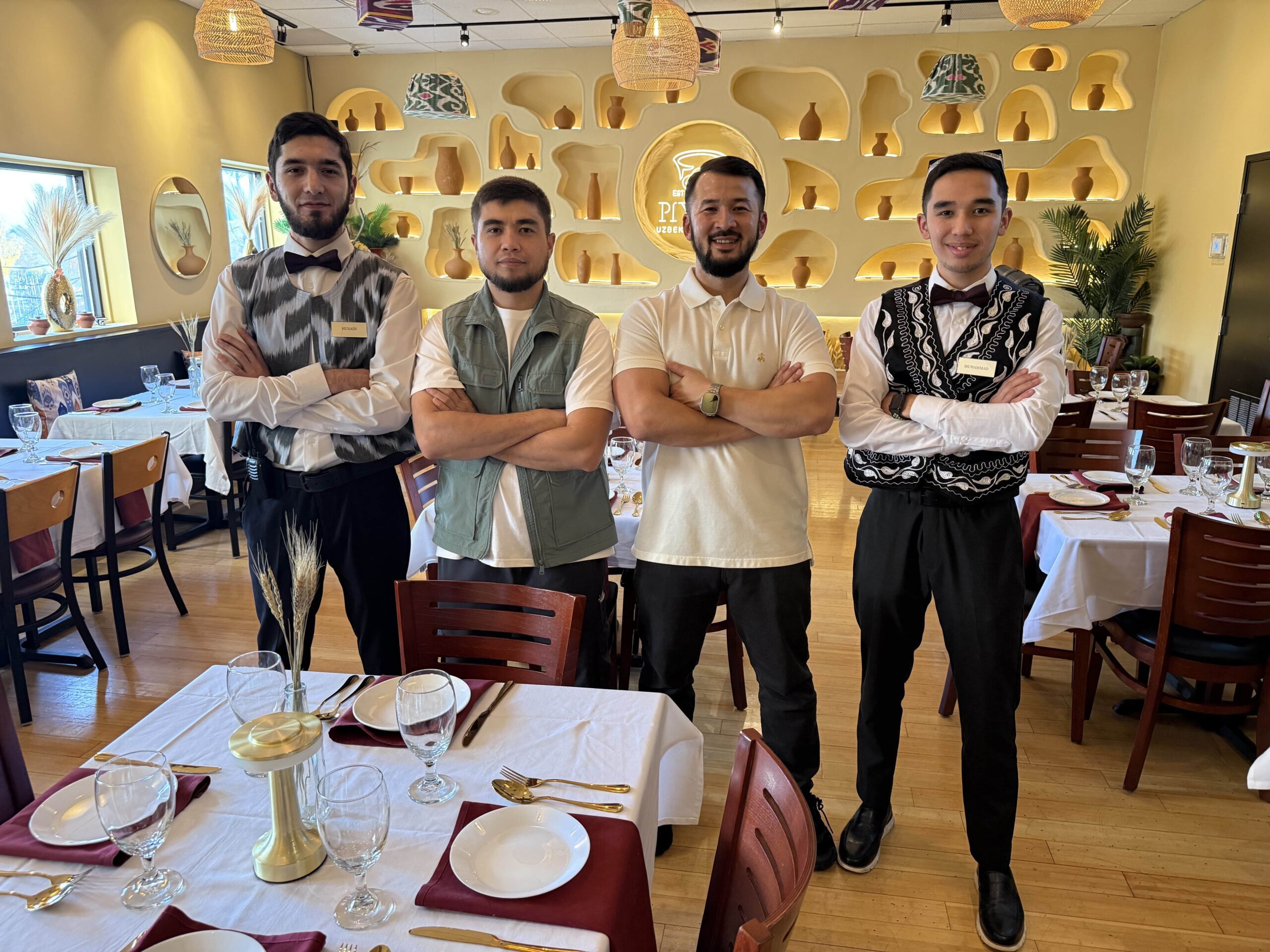By Aakanksha AGARwal
Step into Piyola, and you might forget you’re in Pittsburgh. Warm rattan pendants and ikat-patterned lamps cast a golden glow, while opal-yellow walls with niches of clay pots and vases add earthy charm.
Piyola—Uzbek for “teacup” or “bowl”–is the newest restaurant on the main street of Mt. Lebanon and the first to offer Uzbek cuisine. Owner Sarvar Abdurashidov, a native of Uzbekistan, says, “This is a chance to share the flavors and traditions I grew up with but in a way that feels fresh and approachable.”
Uzbek food is a harmonious blend of Persian spices, Chinese techniques and hearty Central Asian traditions, but Abdurashidov adds a twist. After years of running pizza shops, he’s found a way to fuse bold Uzbek spices with an Italian flair. “It’s an upscale, modernized take on Uzbek food,” he explains.
The menu is a study in contrasts: bright, tangy salads alongside robust, meat-heavy stews; delicate dumplings next to hearty noodle bowls. Non — freshly baked Uzbek bread — has a chewy, golden crust ideal for scooping up richly spiced sauces. And at the heart of it all is plov, Uzbekistan’s beloved national dish of rice pilaf with slow-roasted lamb, steamed carrots, and raisins.
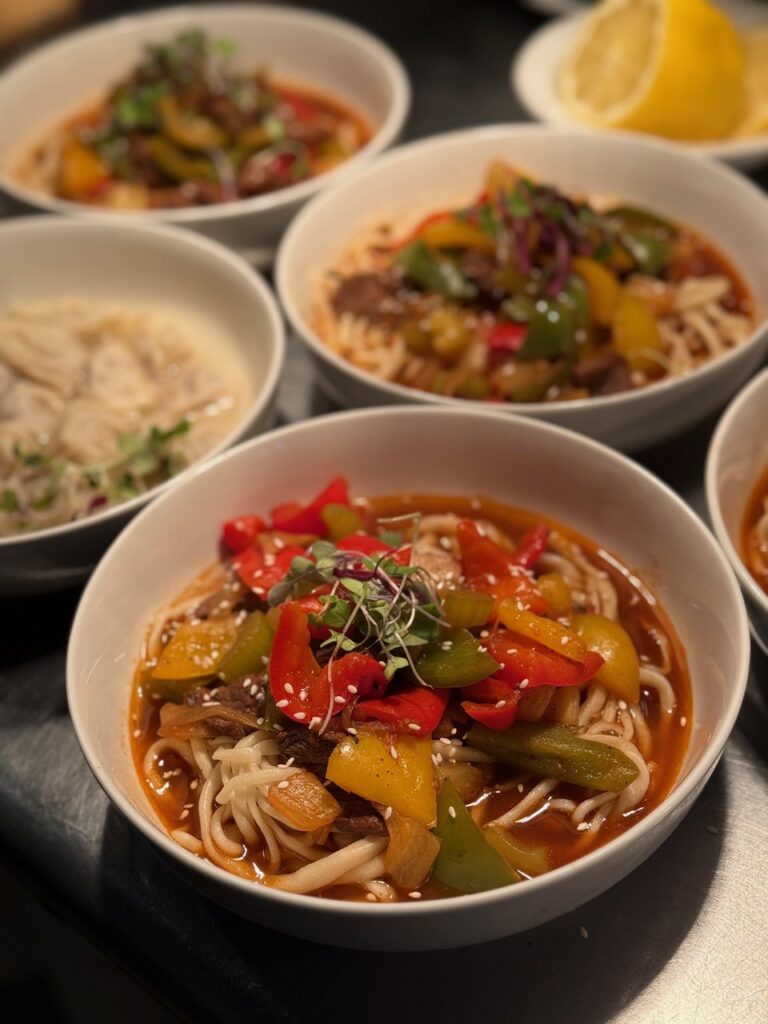
Other highlights include hand-pulled lagman noodles, served in a spiced broth, a Chinese influence, while dumplings like manti and samsa highlight the region’s nomadic heritage, with fillings such as lamb, chicken or seasonal pumpkin.
“Plov represents unity and abundance in Uzbek culture,” says Abdurashidov. “People trying Uzbek cuisine for the first time are often surprised by the diversity of flavors, from the subtle spices in lagman noodles to the sweetness of fruits like pomegranates and raisins that often accompany savory dishes.”
The Italian influences are subtle but purposeful. A burrata salad pairs creamy cheese with vibrant pesto and a hint of zesty pomegranate sauce, while the Caprese salad takes on an Uzbek twist, drizzled with that same smoky-sweet pomegranate touch. On the grill, classic shish kebabs, tender lamb chops, and buttery-seared tenderloin ground the menu in tradition.
Dishes like beshbarmak (lamb shank over wide noodles) and pelmeni (beef dumplings in broth) bring in more comforting, hearty flavors. And, of course, there’s tea: green, black, raspberry-mint, and more, served as a nod to Uzbekistan’s tea culture.
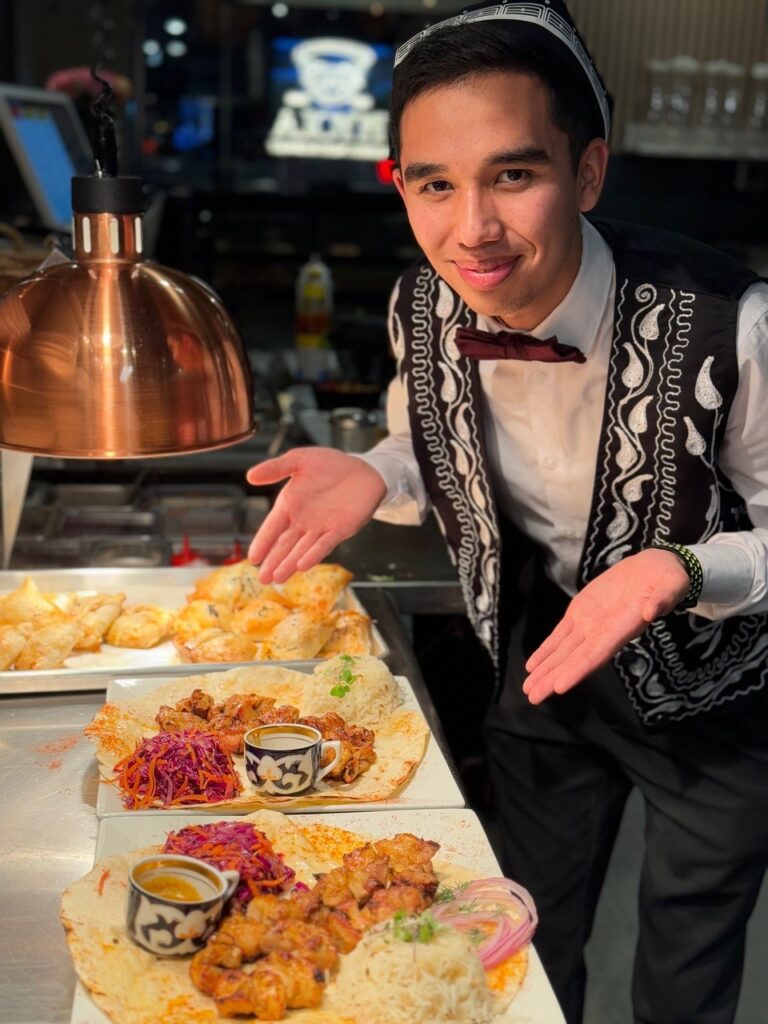
Unlike Chaykhana, his first dive into Uzbek dining in the West End—a traditional spot—Piyola is pure evolution.
“Piyola is about reimagining what Uzbek food can be,” Abdurashidov says. “It’s still rooted in tradition, but it’s lighter, fresher, and designed for communal dining. We wanted it to feel like a modern Silk Road experience.”
The Silk Road was an ancient trade route that connected cultures across Asia, the Middle East, and Europe, mixing goods, ideas and flavors.
These cultural roots run deep for Abdurashidov. He was born in Tashkent, Uzbekistan in a family of restaurateurs that specialized in lavish Uzbek weddings. At 12, he began working in his family’s catering business, where he learned the importance of presentation, teamwork, and, above all, treating guests like family.
“I grew up in a house where the aroma of baking bread and roasting lamb never left,” he says. “If there was a gathering, there was food—and lots of it. That’s the Uzbek way. Uzbek weddings are huge—hundreds of people, endless courses, and always the best food you can offer. At our wedding catering restaurant, we’d prepare plov in massive kazan pans, bake samsas in clay tandoors, and grill kebabs on open flames. Serving 300 guests wasn’t unusual.”
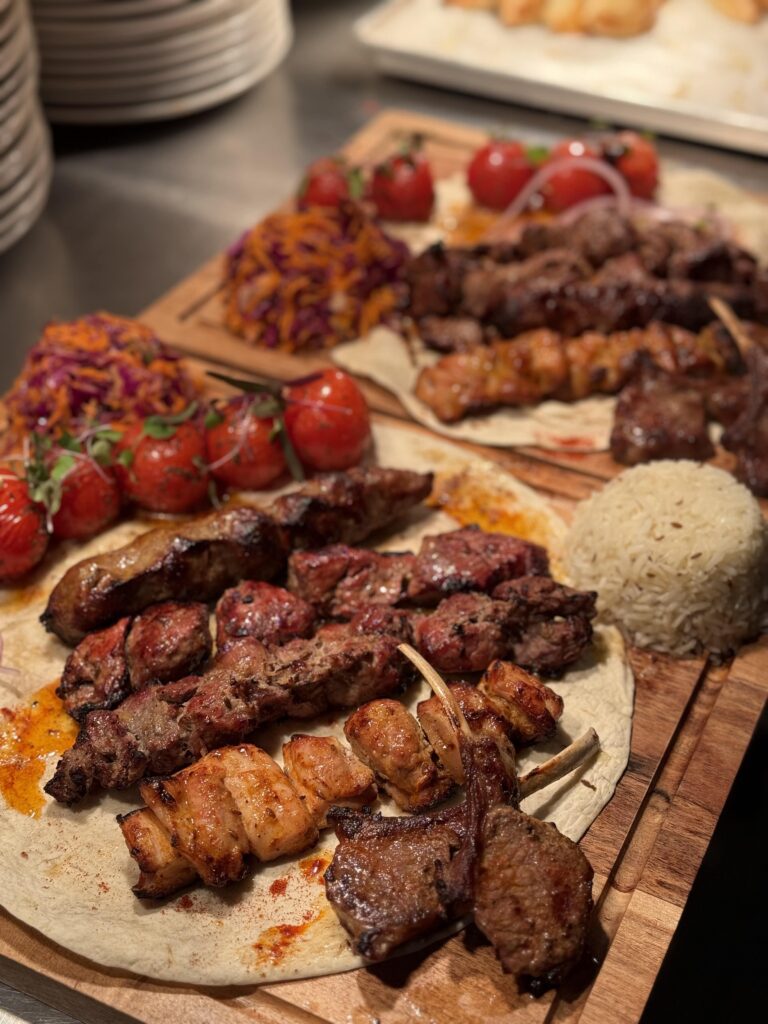
When Abdurashidov moved to Pittsburgh in search of better opportunities in 2013, he wasn’t sure how to transplant the vibrancy of Uzbek cuisine into this new land. He dove into the American restaurant scene, first flipping pizzas at Mario’s Pizza in Green Tree, getting a crash course in timing, dough, and what Americans want on a plate.
“Pizza might seem simple, but it’s an art,” he says. “It taught me about dough, timing, and consistency—all things that carry over into Uzbek cooking. Plus, it was a good introduction to American tastes, which helped when I opened Chaykhana.”
He worked his way through pizza shops and local spots, scrimping and saving until he could buy Bella Monte Pizza in 2017. Then came the pandemic—and everything fell apart. “It was the hardest time,” Abdurashidov admits. High turnover and sinking sales drove him to sell. To keep his family afloat, he pivoted to trucking, which made decent money. But he yearned for the creative fulfillment he found in the kitchen.
When the buyers of his pizza shop defaulted on payments, Abdurashidov was able to reclaim ownership. But instead of resuming with the old concept, he saw the opportunity for reinvention.
In 2023, alongside his business partner Akmal Ikromov, Abdurashidov opened Chaykhana in Pittsburgh’s West End. It was an homage to the chaikhanas (teahouses) of his homeland, where people gathered over tea and food.
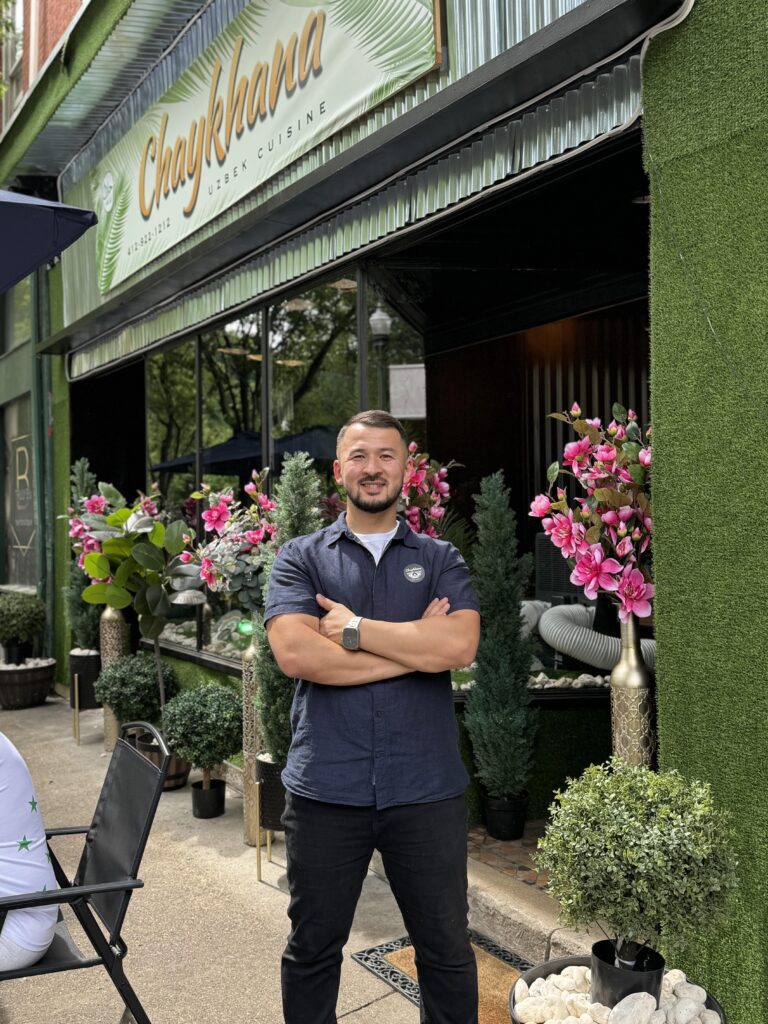
Initially, Chaykhana was a haven for Pittsburgh’s Uzbek community, but word quickly spread beyond the diaspora. The bold flavors of lagman noodles, lamb kebabs, and plov attracted diners from across the city. Abdurashidov made sure to stay true to the flavors of his homeland while making the food approachable for everyone, introducing people to ingredients like dried barberries and caraway.
“The first customers were mostly Uzbek, about 90 percent Uzbek people longing for a taste of home, and about 10 percent non-Uzbek people. I didn’t expect to see that ratio even out so soon,” Abdurashidov says. “People came because they were curious about our culture—and because the food was good.”
Chaykhana, in a way, served as a springboard for Piyola, where Abdurashidov’s growth as a restaurateur takes flight. “It’s still who I am, but it’s everything I’ve learned about food, people, and storytelling,” he says.
Across both restaurants, Abdurashidov’s unwavering commitment to the Uzbek tradition of hospitality is evident. “In Uzbekistan, the concept of ‘mehmon’—guest—is sacred,” he says. “A guest is considered a blessing. When someone enters your home, or your restaurant, you give them the best of what you have. That’s a value I carry with me, no matter where I am.”
The New Americans is a first-of-its-kind journalism initiative with the mission to spotlight the contributions of immigrants to the Pittsburgh region, and ultimately to create a more welcoming and global city. The stories are available for free to all Pittsburgh media. Read more stories here.

